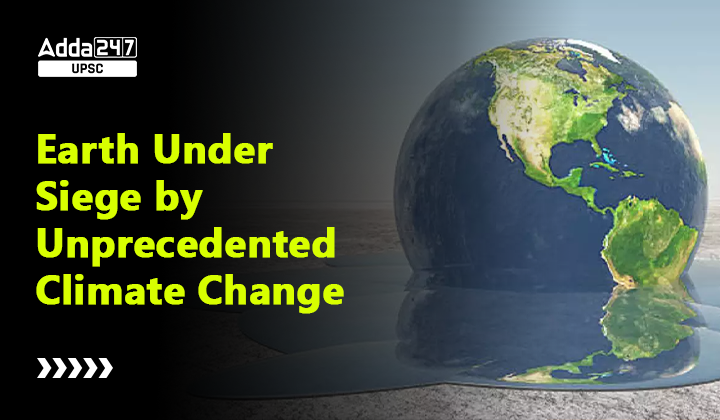Table of Contents
In an alarming and urgent call to action, a global coalition of scientists has united to deliver a stark warning to humanity: Earth is under siege, and our planet is facing unprecedented threats due to the devastating impacts of climate change. The “2023 State of the Climate Report” presents a comprehensive assessment of the current state of our environment, highlighting the dire consequences of human-induced climate change. This article delves into the key findings of the report and the urgent need for collective efforts to address the looming crisis.
Climate Crisis Unveiled
Vital Signs in Peril
- The report emphasizes that the Earth’s “vital signs” have deteriorated to a level never witnessed by humanity. Twenty out of the 35 vital signs used to monitor climate change are now at record extremes.
- These vital signs encompass various aspects of our environment, from temperature and sea ice levels to extreme weather events, all of which have been profoundly impacted by global warming.
Uncharted Territory
- The scientists do not mince words in their assessment. They assert that life on Earth is in uncharted territory, and the consequences of climate change are escalating at an alarming rate.
- For decades, scientists have been warning of the dire outcomes of increasing global temperatures resulting from human activities, which release harmful greenhouse gases into the atmosphere. Unfortunately, as the report states, “time is up.”
Alarming Climate Records
Ocean Temperature and Sea Ice
- One of the most concerning aspects of the report is the revelation of the dire state of the Earth’s oceans. Record-breaking temperatures and the dramatic loss of sea ice have left our marine ecosystems in a state of crisis.
- The impacts of these changes are felt far and wide, from disrupting ocean currents to threatening marine biodiversity.
Fossil Fuel Subsidies
- The report draws attention to the role of fossil fuel subsidies in exacerbating the climate crisis. Certain governments have been artificially lowering the cost of energy production through these subsidies, which distort market dynamics and make fossil fuels more appealing.
- The report reveals a staggering increase in fossil fuel subsidies, doubling from $531 billion in 2021 to over $1 trillion in 2022, exacerbating the environmental and economic consequences of our reliance on fossil fuels.
Unprecedented Temperature Extremes
Global Average Temperatures
- In 2023, the world experienced an alarming trend of global average temperatures exceeding 1.5 degrees Celsius above pre-industrial levels for 38 days.
- This is a significant departure from historical norms and highlights the accelerating pace of climate change. Such temperature extremes were rare until this year, and their frequency is a cause for great concern.
Record-Breaking Surface Temperatures
- July 2023 marked a grim milestone as the highest average surface temperature of the planet was recorded.
- This scorching statistic underscores the urgency of addressing climate change and its devastating consequences on the environment, ecosystems, and human societies.
Escalating Climate-Related Disasters
Rising Frequency and Severity
- The report underscores the alarming rise in the frequency and severity of climate-related disasters. These catastrophic events, which include wildfires, hurricanes, floods, and droughts, are occurring with increasing regularity and intensity.
- In some regions, the rate at which these disasters are unfolding may be outpacing the rate of rising temperatures.
Implications for the Future
- Christopher Wolf, a co-author of the report, expresses deep concern about the consequences of these disasters, such as severe heatwaves, limited food availability, and elevated mortality rates.
- If the current trajectory continues, many regions could face dire circumstances by the end of the 21st century, with devastating implications for both human societies and the planet’s ecosystems.
Addressing Ecological Overshoot
Beyond Carbon Emissions
- The report emphasizes the need to address the underlying issue of “ecological overshoot.” When humanity’s demand for Earth’s resources exceeds its capacity to regenerate, it leads to an array of environmental crises, including biodiversity decline.
- Focusing solely on carbon emissions or climate mitigation without addressing this overarching ecological challenge merely redistributes the pressure to other aspects of the environment.
Equity and Social Justice
- Furthermore, the report highlights the importance of grounding climate-related actions in principles of equity and social justice.
- The impacts of climate change disproportionately affect the most vulnerable and marginalized communities, who often contribute the least to the problem.
- Recognizing and rectifying this injustice is a fundamental aspect of any effective response to the climate crisis.
Climate Change Call to Action
Urgent Global Response
The findings of the “2023 State of the Climate Report” paint a bleak picture of our planet’s current condition. To address the impending crisis, there is an urgent need for a global response that transcends borders, political affiliations, and economic interests. The world must unite to combat the climate emergency.
Transition to Sustainable Practices
- Transitioning to sustainable practices, renewable energy sources, and eco-friendly technologies is no longer an option but a necessity.
- Governments, industries, and individuals must take immediate steps to reduce greenhouse gas emissions and limit global temperature increases.
Policy and Lifestyle Changes
- Policy changes at both the national and international levels are vital to accelerate the transition to a sustainable future. Governments must phase out fossil fuel subsidies, implement carbon pricing mechanisms, and invest in green infrastructure.
- Additionally, individuals can contribute through lifestyle changes, such as reducing energy consumption, adopting sustainable diets, and advocating for climate-conscious policies.
Climate Education and Advocacy
- Education and advocacy play a crucial role in addressing the climate crisis. Raising awareness about the severity of the issue and the need for urgent action can mobilize communities and drive change.
- Climate education must become a fundamental part of school curricula, and citizens can engage in advocacy efforts to press for climate action.
Conclusion
The “2023 State of the Climate Report” serves as an alarming wake-up call, reminding us that Earth is under siege, and time is running out to address the climate crisis. The vital signs of our planet are deteriorating at an unprecedented rate, and the consequences of inaction are dire. Addressing the climate emergency requires a collective effort, grounded in principles of equity and social justice. It necessitates a global response, a transition to sustainable practices, policy changes, and widespread climate education and advocacy. The urgency of the situation cannot be overstated, and humanity must act now to mitigate the devastating impacts of climate change and ensure a sustainable future for generations to come.



 TSPSC Group 1 Question Paper 2024, Downl...
TSPSC Group 1 Question Paper 2024, Downl...
 TSPSC Group 1 Answer key 2024 Out, Downl...
TSPSC Group 1 Answer key 2024 Out, Downl...
 UPSC Prelims 2024 Question Paper, Downlo...
UPSC Prelims 2024 Question Paper, Downlo...





